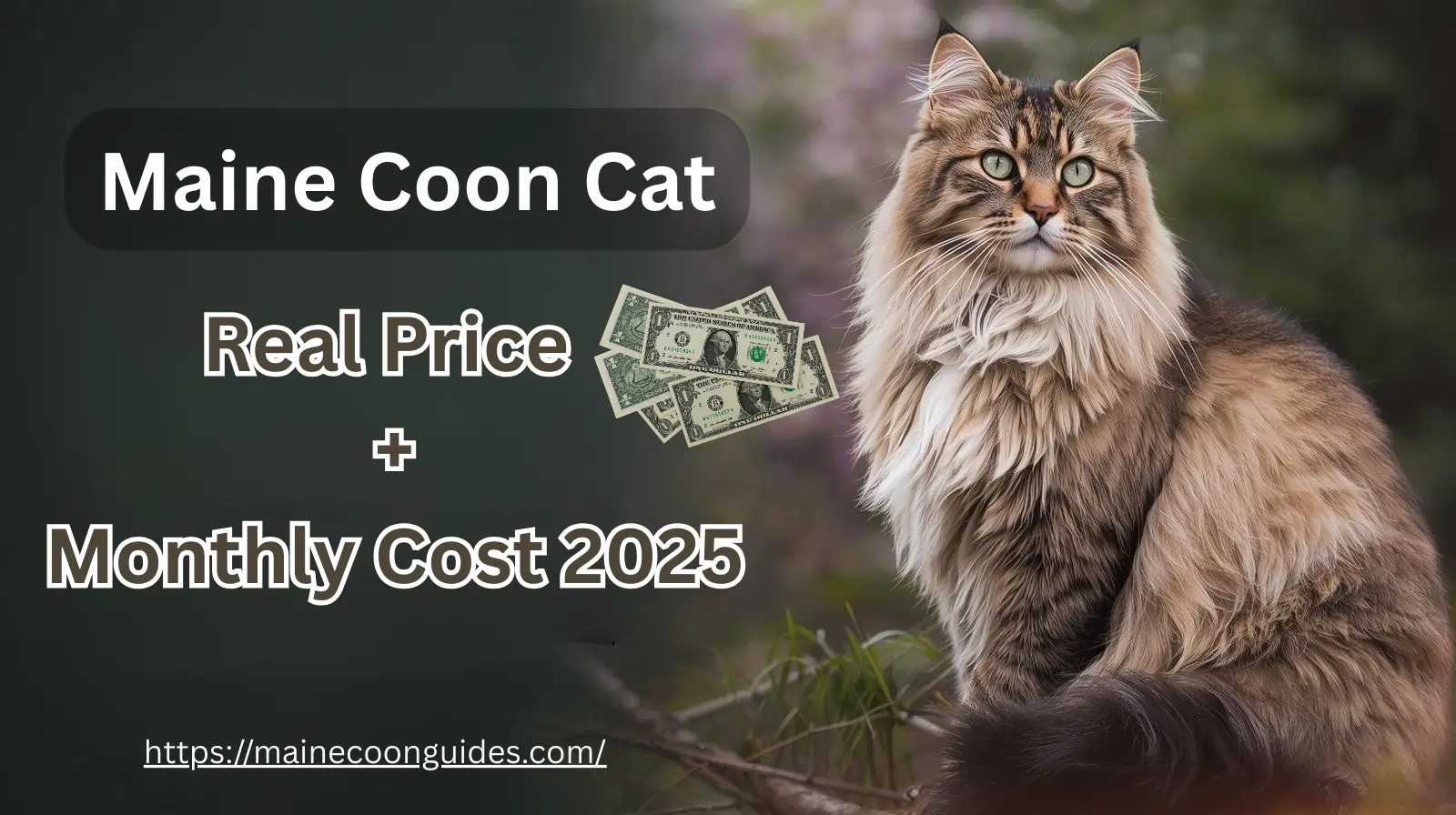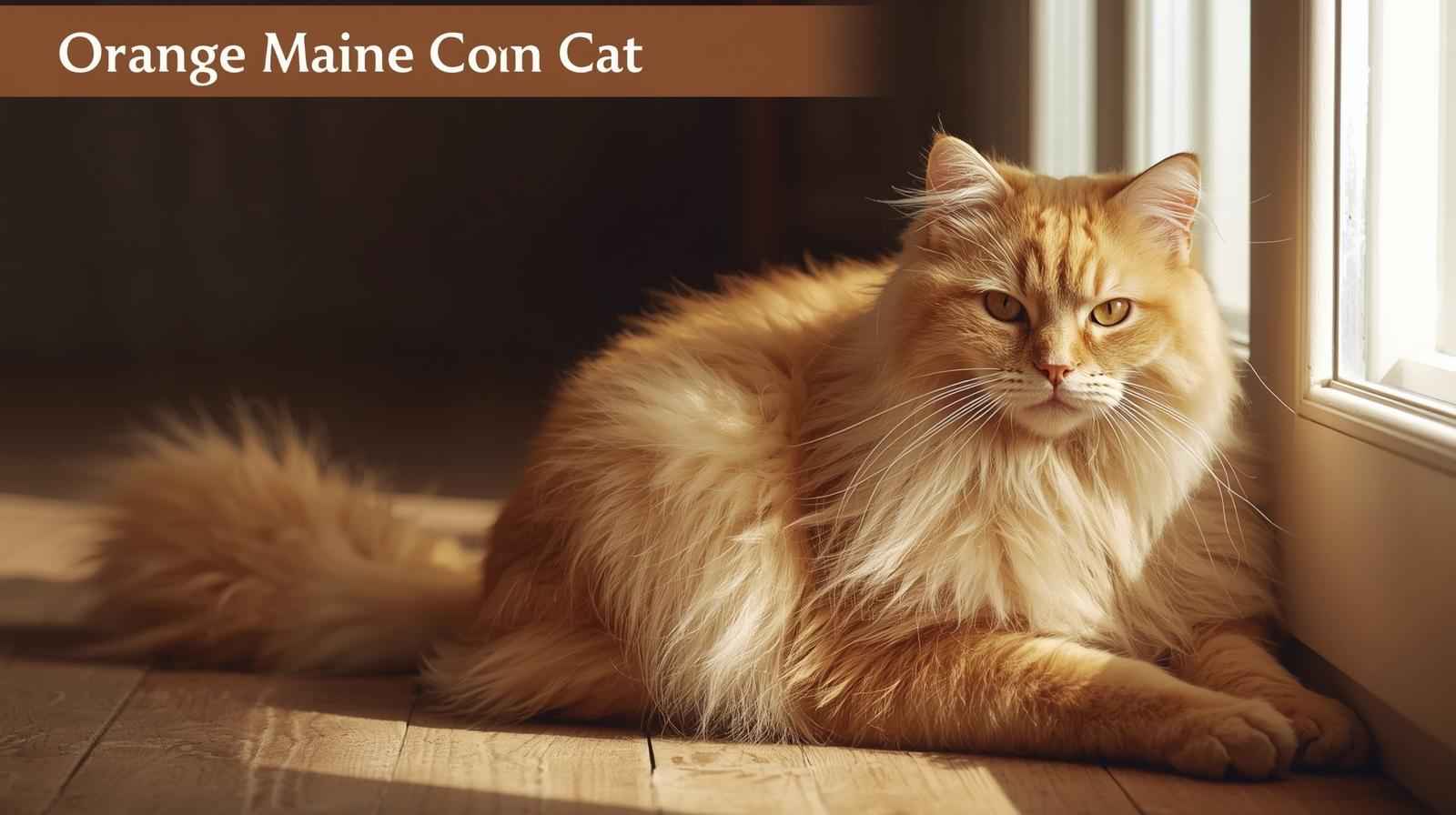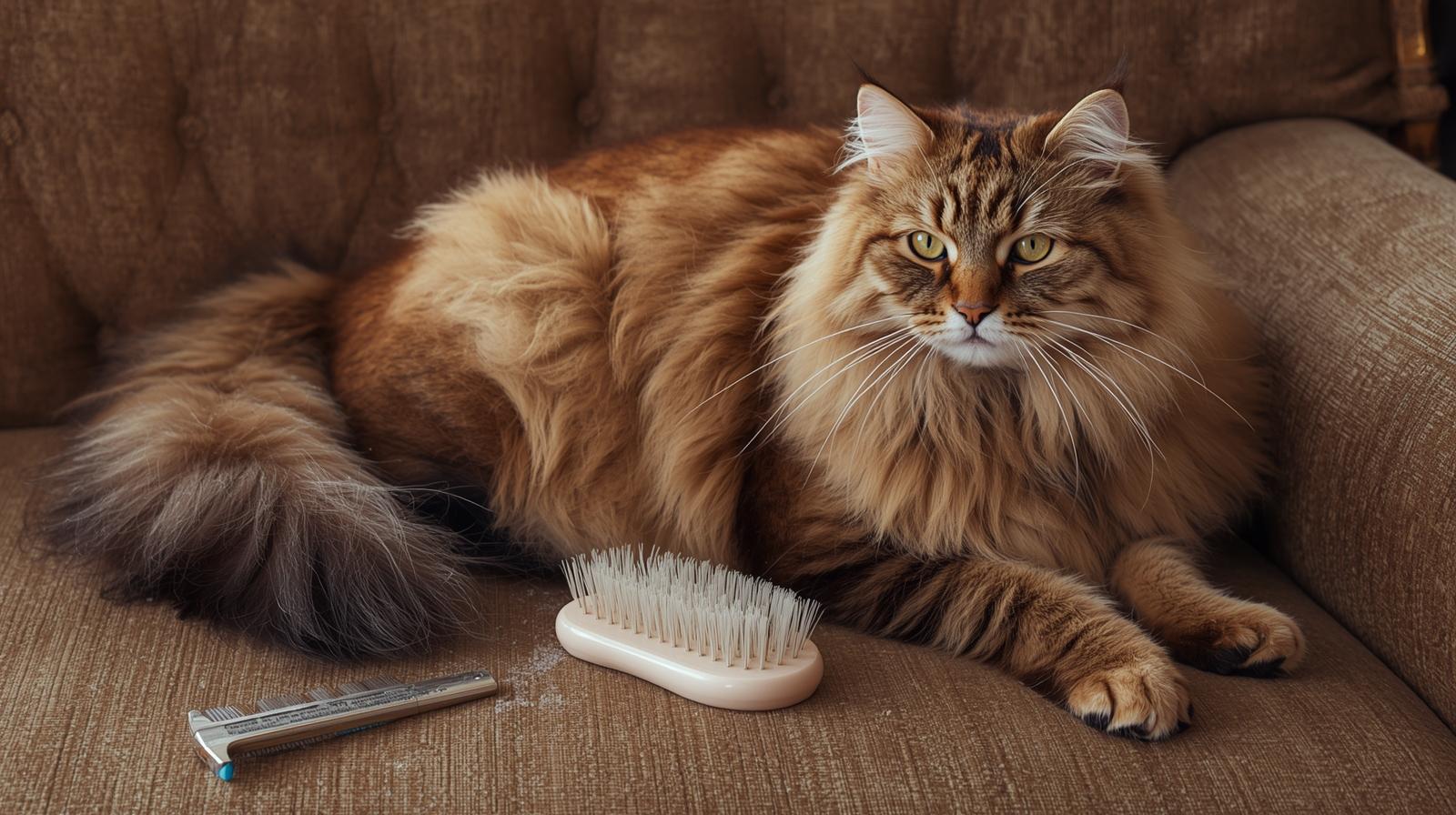The Ultimate Maine Coon Encyclopedia: Facts & Care Tips
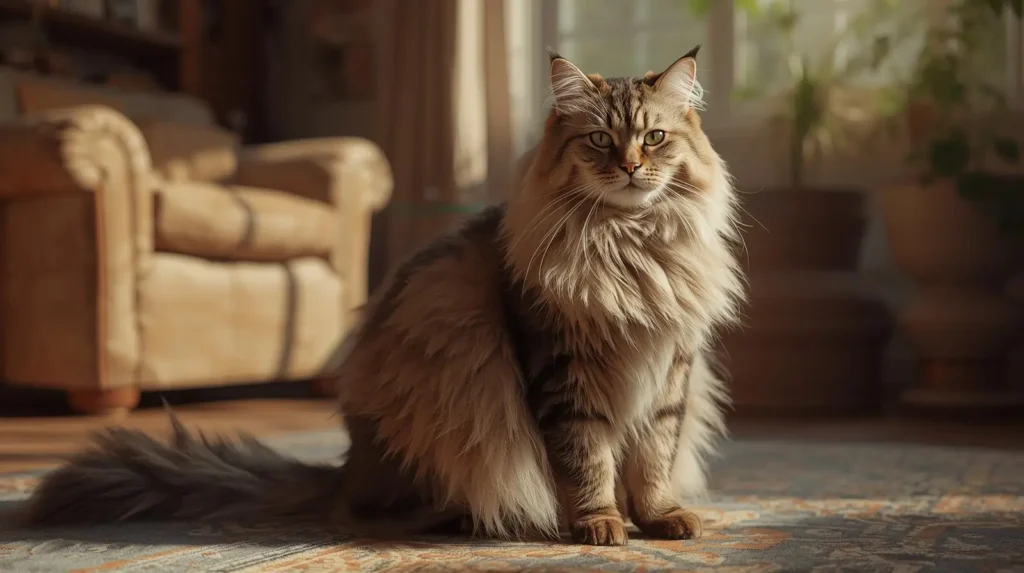
Introduction
The Maine Coon stands as one of America’s most beloved and distinctive cat breeds earning its reputation as the gentle giant of the feline world. These magnificent cats combine impressive size with remarkable temperament making them ideal companions for families seeking a loving intelligent pet. Originally hailing from the rugged state of Maine these cats have captured hearts worldwide with their distinctive appearance, dog-like personalities, and exceptional adaptability to various living situations.
Maine Coon cats represent more than just a breed; they embody a perfect balance of wild beauty and domestic charm. Their luxurious coats tufted ears and substantial build tell the story of their hardy New England origins while their gentle nature reveals centuries of selective breeding for companionship. Understanding the Maine Coon means appreciating both their physical magnificence and their remarkable social intelligence.
Origins and History of the Maine Coon
The Maine Coon’s history stretches back to the mid-1800s, though their exact origins remain shrouded in fascinating folklore and educated speculation. Most historians believe these cats developed naturally in the harsh climate of Maine, where only the strongest and most adaptable felines could survive the brutal winters. The breed likely emerged from crosses between long-haired cats brought by seafarers and local short-haired cats already established in the region.
One popular legend suggests that Maine Coons descended from cats belonging to Marie Antoinette, supposedly shipped to America during the French Revolution. While romantic, genetic evidence points to more practical origins involving working cats aboard merchant ships. These maritime cats needed to be hardy, intelligent, and capable of controlling rodent populations during long voyages.
The first recorded Maine Coon appeared in cat literature in 1861, with a black and white male named Captain Jenks of the Horse Marines. By the 1870s, Maine Coons were competing in cat shows across New England, with many winning prestigious awards. The breed gained national recognition when a Maine Coon named Cosey won the first major cat show at Madison Square Garden in 1895.
As noted by cat historian Jane Doe, The Maine Coon represents the quintessential American cat – hardy, independent, yet deeply loyal to their families. This sentiment captures the essence of why these cats became so integral to American households.
Physical Characteristics and Size Statistics
Maine Coons are renowned for being the largest domestic cat breed, with males typically weighing between 13-18 pounds and females ranging from 8-12 pounds. However, some exceptional males have reached weights exceeding 25 pounds, though this often indicates overfeeding rather than natural size. The breed’s substantial bone structure and muscular build contribute significantly to their impressive weight.
Size Comparison Table
| Gender | Average Weight | Length Range | Height Range |
|---|---|---|---|
| Male | 13-18 lbs | 30-40 inches | 10-16 inches |
| Female | 8-12 lbs | 30-40 inches | 8-14 inches |
| Record Holders | 25+ lbs | 48+ inches | 16+ inches |
The Maine Coon’s coat represents one of their most distinctive features, designed for harsh New England winters. Their fur consists of three layers: a soft undercoat for insulation, longer guard hairs for protection, and water-resistant outer hairs. This triple-layer system allows them to regulate body temperature effectively in various climates.
Their ears feature distinctive lynx-like tufts while their paws are large and well-tufted functioning like natural snowshoes. The breed’s tail is exceptionally long and bushy often measuring as long as their body and serving as a warm wrap during cold weather. Maine Coons come in virtually every color and pattern except chocolate lavender and pointed patterns.
Temperament and Personality Traits
Maine Coons possess remarkably dog-like personalities, often greeting their owners at the door and following them throughout the house. Their intelligence ranks among the highest of all cat breeds, with many owners reporting that their Maine Coons can learn tricks, respond to their names, and even play fetch. These cats typically form strong bonds with their families while remaining friendly toward strangers.
Their vocalization patterns set them apart from other breeds, as Maine Coons rarely meow in traditional ways. Instead, they communicate through chirps, trills, and chattering sounds, earning them the nickname talking cats. This unique vocal repertoire allows them to express various emotions and needs effectively.
Maine Coons demonstrate exceptional patience with children, making them ideal family pets. Their gentle nature means they’re less likely to scratch or bite when overwhelmed, instead choosing to remove themselves from stressful situations. This temperament trait has made them popular therapy cats in various institutional settings.
Cat behaviorist Dr. Sarah Johnson observes, Maine Coons possess an almost uncanny ability to read human emotions and respond appropriately, making them exceptional emotional support animals.
Health Considerations and Lifespan
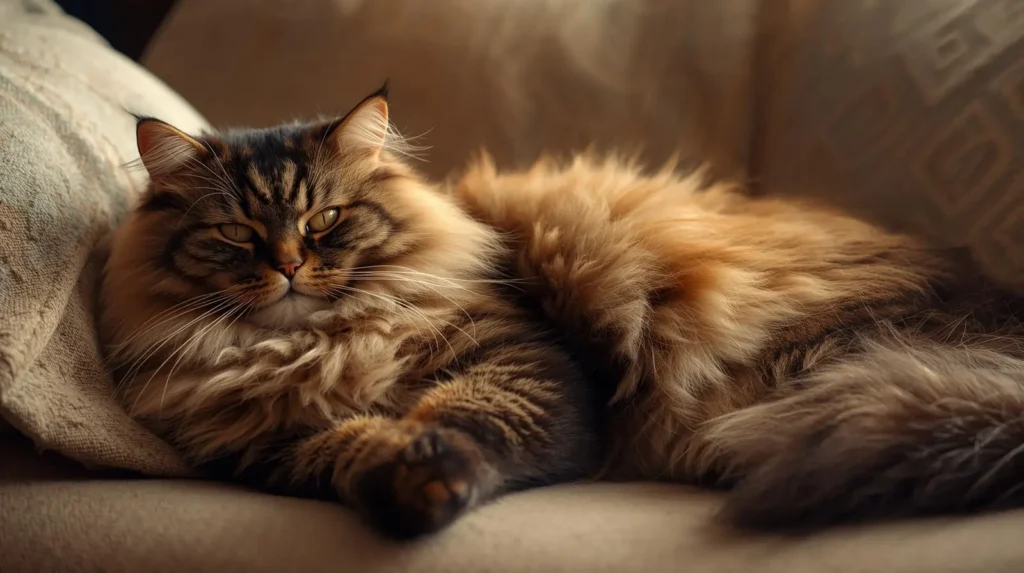
Maine Coons typically enjoy lifespans of 12-15 years, though some individuals have reached 18-20 years with proper care. Like all purebred cats, they’re susceptible to certain genetic conditions that responsible breeders screen for regularly. Understanding these potential health issues helps owners provide preventive care and early intervention when necessary.
Common Health Conditions
Hypertrophic cardiomyopathy represents the most significant health concern in Maine Coons, affecting approximately 30% of the breed according to recent veterinary studies. This heart condition causes thickening of the heart muscle, potentially leading to heart failure if left untreated. Responsible breeders now conduct regular cardiac screenings to reduce the incidence of this condition.
Hip dysplasia, while more common in dogs, also affects Maine Coons due to their large size and bone structure. This condition involves malformation of the hip joint, potentially causing arthritis and mobility issues as cats age. Regular veterinary examinations and maintaining healthy weight can help minimize the impact of hip dysplasia.
Spinal muscular atrophy, a genetic condition affecting nerve cells in the spinal cord, occurs in some Maine Coon lines. While not typically fatal, this condition can affect mobility and quality of life. Genetic testing now allows breeders to identify carriers and make informed breeding decisions.
Polycystic kidney disease occasionally appears in Maine Coons, though it’s more common in Persian cats. This condition involves the development of cysts in the kidneys, potentially leading to kidney failure over time. Regular blood work can help detect early signs of kidney problems.
Grooming and Maintenance Requirements
Maine Coons require regular grooming to maintain their magnificent coats and prevent matting. Their long, thick fur needs brushing at least three times per week, with daily brushing recommended during shedding seasons. Using a combination of metal combs and slicker brushes helps remove loose fur and prevent tangles from forming.
The breed’s undercoat tends to mat easily, particularly around the legs, belly, and behind the ears. Regular attention to these areas prevents painful mats that may require professional grooming or even shaving to remove. Many Maine Coon owners find that establishing a grooming routine early in their cat’s life makes the process enjoyable for both pet and owner.
Bathing Maine Coons occasionally helps maintain coat health, though their water-resistant fur can make thorough wetting challenging. Using warm water and working shampoo through all coat layers ensures effective cleaning. Many Maine Coons actually enjoy water more than other cat breeds, making bath time less stressful.
According to professional groomer Lisa Chen, Maine Coons who receive regular grooming not only look better but also experience fewer skin issues and hairballs, contributing to overall health and comfort.
Feeding and Nutrition Guidelines
Maine Coons require high-quality nutrition to support their large size and active metabolism. Adult cats typically consume 3/4 to 1 cup of dry food daily, divided into two meals, though individual needs vary based on age, activity level, and health status. Kittens and young adults may require significantly more food to support their growth and development.
The breed’s slow maturation process means Maine Coons continue growing until age 3-4, requiring kitten food longer than most breeds. This extended growth period demands consistent high-protein nutrition to support proper bone and muscle development. Many veterinarians recommend feeds containing at least 32% protein for growing Maine Coons.
Weight management becomes crucial for Maine Coons due to their size and potential for obesity. Overweight cats face increased risks of diabetes, heart disease, and joint problems. Regular weigh-ins and portion control help maintain optimal body condition throughout their lives.
Fresh water availability remains essential, as Maine Coons tend to drink more water than smaller breeds. Some owners find that water fountains encourage increased water consumption, supporting kidney health and preventing urinary tract issues.
Exercise and Environmental Enrichment
Despite their laid-back reputation, Maine Coons require regular exercise and mental stimulation to maintain physical and psychological health. Their large size means they need more space than typical house cats, with vertical territory being particularly important for climbing and perching.
Interactive play sessions using feather wands, laser pointers, and puzzle toys help satisfy their hunting instincts while providing necessary exercise. Maine Coons often enjoy games of fetch, making them more interactive pets than many cat breeds. Their intelligence means they benefit from rotating toys regularly to prevent boredom.
Many Maine Coons enjoy outdoor access through secure enclosures or supervised outdoor time. Their hardy nature makes them well-suited for outdoor exploration, though owners must consider local wildlife, traffic, and other cats when allowing outdoor access. Screened porches or cat runs provide safe outdoor experiences.
Climbing structures become essential for Maine Coons, as they naturally seek elevated vantage points. Tall cat trees, wall-mounted shelves, and window perches accommodate their size while satisfying their climbing instincts. Ensuring these structures can support their substantial weight prevents accidents and injuries.
Breeding and Genetics Considerations
Maine Coon breeding requires extensive knowledge of genetics, health testing, and breed standards to produce healthy, well-tempered kittens. Responsible breeders conduct comprehensive health screenings on breeding cats, including cardiac evaluations, hip scoring, and genetic testing for inherited conditions.
The breed’s genetic diversity has decreased over recent decades due to popular sire effects and limited breeding populations in some regions. Maintaining genetic diversity requires careful planning and sometimes outcrossing to unrelated bloodlines. This genetic management helps reduce the incidence of inherited diseases while preserving breed characteristics.
Maine Coon queens typically produce litters of 3-5 kittens after a 65-day gestation period. Kittens develop slowly compared to other breeds, often not reaching full size until age 3-4. This extended development period requires patient owners willing to accommodate growing cats for several years.
Color genetics in Maine Coons allow for tremendous variety, with over 75 recognized color and pattern combinations. Understanding color genetics helps breeders predict offspring appearance while avoiding combinations that might produce undesirable traits or health issues.
Professional breeder Mark Thompson states, Successful Maine Coon breeding requires balancing genetic health, temperament, and breed type while always prioritizing the welfare of the cats involved.
Maine Coon as Family Pets
Maine Coons excel as family pets due to their adaptable nature and gentle temperament with children and other pets. Their patient disposition makes them suitable for households with young children, though supervision remains important during initial introductions. These cats often become deeply bonded with all family members rather than choosing a single favorite person.
Their integration with other pets generally proceeds smoothly, particularly when introductions occur gradually. Maine Coons often coexist peacefully with dogs, especially when raised together from young ages. Their non-aggressive nature means they’re more likely to retreat from conflicts than engage in fighting.
The breed’s intelligence makes them relatively easy to train for household routines and basic commands. Many Maine Coons learn to walk on leashes, come when called, and perform simple tricks. This trainability, combined with their social nature, makes them excellent candidates for therapy work in appropriate settings.
Housing requirements for Maine Coons include adequate space for their size and activity needs. While they can adapt to apartment living, they thrive in homes with more room to roam and explore. Access to windows for watching outdoor activity helps satisfy their curious nature when indoor-only living is necessary.
Choosing a Maine Coon: Breeder vs Rescue
Prospective Maine Coon owners face the choice between purchasing from breeders or adopting from rescue organizations. Each option presents distinct advantages and considerations that potential owners should carefully evaluate based on their preferences and circumstances.
Reputable breeders offer the advantage of known lineage, health testing, and early socialization. They can provide detailed information about parents’ temperaments and health histories, helping predict adult characteristics. However, quality Maine Coon kittens from health-tested parents typically cost $800-2000, representing a significant financial investment.
Maine Coon rescue organizations often have adult cats and kittens available for adoption at lower costs, typically $100-400. These cats may come with unknown histories but often prove to be wonderful companions. Adult cats from rescues allow potential owners to see fully developed personalities and characteristics.
When selecting a breeder, important considerations include health testing documentation, facility cleanliness, and socialization practices. Responsible breeders welcome visits, provide health guarantees, and maintain ongoing relationships with kitten buyers. They should readily provide documentation of genetic testing and veterinary care.
Rescue organizations typically conduct home visits and interviews to ensure good matches between cats and families. They often provide valuable information about individual cats’ personalities, preferences, and any special needs requiring consideration.
Conclusion
The Maine Coon represents the perfect combination of beauty, intelligence, and gentle temperament that has made them one of America’s most cherished cat breeds. From their mysterious origins in the harsh climate of Maine to their current status as beloved family companions worldwide, these magnificent cats continue to captivate hearts with their dog-like personalities and stunning appearance.
Their substantial size, luxurious coats, and distinctive features make them unmistakable among cat breeds, while their adaptable nature and exceptional intelligence ensure they fit seamlessly into various household situations. Whether serving as therapy cats, family pets, or show cats, Maine Coons consistently demonstrate the qualities that have made them legendary among cat enthusiasts.
Understanding the Maine Coon means appreciating their unique needs for grooming, nutrition, and environmental enrichment while recognizing their potential health considerations. With proper care, these gentle giants provide years of companionship, entertainment, and unconditional love to their families.
For more comprehensive information about Maine Coon care and characteristics, visit Mainecoon Guides for detailed resources and expert advice. Additional research on feline health and genetics can be found through the Cornell Feline Health Center’s extensive database.
As we’ve explored the fascinating world of Maine Coons, from their storied past to their bright future as companion animals, one question remains: could these remarkable gentle giants be the perfect addition to transform your house into a truly loving home?

